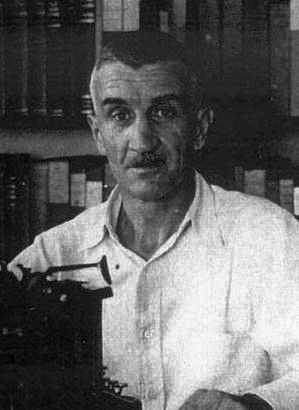Lost Island
Book Details
| Title: | Lost Island | ||||||||||
| Author: |
| ||||||||||
| Published: | 1944 | ||||||||||
| Publisher: | The Sun Dial Press | ||||||||||
| Tags: | fiction, South Pacific, war, World War II | ||||||||||
| Description: | James Norman Hall came back from WWI service in France and was appalled by the pace of change the war had brought to America. With fellow vet Charles Nordhoff he left for Tahiti, and spent most of his life in Polynesia. He and Nordhoff wrote several books together, of which the Bounty trilogy are the best known, and Hall wrote a number of works alone including Lost Island. The book is a quick read that gives a brief picture of life in the South Pacific during WWII. The story (set and written during WWII), takes place on a small island in the pacific ocean that is about to be converted into a military base. The events in the story are seen through the eyes of the main character and narrator, an engineer, sent to evaluate the island before soldiers come to build a Seabee base. The story in real life is supposed to be the story of Bora Bora. [Suggest a different description.] |
||||||||||
| Downloads: | 116 | ||||||||||
| Pages: | 114  |
Author Bio for Hall, James Norman

James Norman Hall (22 April 1887—5 July 1951) was born in Colfax, Iowa, where he attended the local schools. Hall graduated from Grinnell College in 1910 and became a social worker in Boston, Massachusetts, while trying to establish himself as a writer and studying for a Master's degree from Harvard University. He was on vacation in the United Kingdom in the summer of 1914, when World War I began. Posing as a Canadian, he enlisted in the British Army, serving in the Royal Fusiliers as a machine gunner during the Battle of Loos. He was discharged after his true nationality was discovered, and he returned to the United States and wrote his first book, Kitchener's Mob (1916), recounting his wartime experiences.
Returning to France, in 1916 Hall joined the Lafayette Escadrille, an American volunteer flying squadron in the French Air Force. During his time in the Escadrille, Hall was awarded the Croix de Guerre and the Médaille Militaire. When the United States entered the war, Hall was made a Captain in the Army Air Service. After being shot down over enemy lines, Hall spent the last months of the war as a German prisoner of war. After being released, he was awarded the French Légion d’Honneur and the American Distinguished Service Cross.
After the war, Hall spent much of his life on the island of Tahiti, where he and Charles Nordhoff, who had also moved there, wrote a number of successful adventure books (including the Bounty trilogy). In addition to the various Bounty films, other film adaptations of his fiction include The Hurricane (1937), which starred his nephew Jon Hall; Passage to Marseille (1944), featuring Humphrey Bogart; and Botany Bay (1953), with Alan Ladd.
In 1940, Hall published a book of poems with the title Oh Millersville! It appeared under the pseudonym Fern Gravel, and the poems were written in the voice of a girl of about 10 years of age. The book was critically well received, and the hoax wasn't exposed until 1946, when Hall published an article entitled "Fern Gravel: A Hoax and a Confession" in the Atlantic Monthly. He wrote that he had been inspired by a dream in which he saw himself back in his Iowa childhood with a group of children, among whom was a girl named Fern who wanted her poems written down. When he awoke, Hall wrote Fern's poems, which are simply worded but nicely detailed first-person observations of small-town life.
Hall died in Tahiti and is buried on the hillside property just above the wooden house he lived in for many years; the house, now restored, is a family museum.
—Source: military.wikia.com
Available Formats
No book directory. Upload has not been completed.This book is in the public domain in Canada, and is made available to you DRM-free. You may do whatever you like with this book, but mostly we hope you will read it.
Here at FadedPage and our companion site Distributed Proofreaders Canada, we pride ourselves on producing the best ebooks you can find. Please tell us about any errors you have found in this book, or in the information on this page about this book.